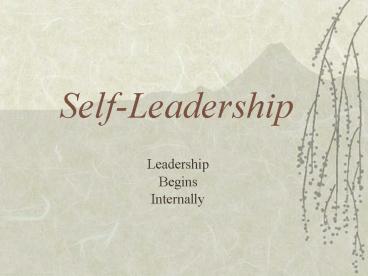SelfLeadership - PowerPoint PPT Presentation
1 / 14
Title:
SelfLeadership
Description:
Choosing a career, job and tasks that we find rewarding unto themselves. ... Convergent Thinkers or Solution finders. Combining an interest in thinking and doing. ... – PowerPoint PPT presentation
Number of Views:211
Avg rating:3.0/5.0
Title: SelfLeadership
1
Self-Leadership
- Leadership
- Begins
- Internally
2
Self-Leadership
- Using character to motivate
decisions and choices. - Understanding the mutual influence
of self action and external forces. - Choosing to Be Proactive when
faced with challenges. - Choosing how things affect us
- Attitude is everything.
- Motivating yourself to persist and endure through
adversity and challenge.
3
Self-leadership When Challenged
- Self-leadership assessment
- How strategic are you?
- World-altering strategies
- Self-imposed strategies
- Goal setting for performance improvement
- More on this next week
- What is your purpose? What will your legacy be?
4
Motivation in Self-Leadership
- Extrinsic
- Seeking desired rewards.
- Understanding the effect certain rewards have on
our behavior. - Intrinsic
- Choosing a career, job and tasks that we find
rewarding unto themselves. - Concept of flow in work.
- The joy of the actual work.
5
How Does Self-Leadership Influence Learning?
- Motivation techniques used?
- Social awareness?
- Attitude?
- Risk taking?
- Attribution of causality?
- Other ways?
6
Self-Leadership and Personal Skill Learning
- Five critical insights
- Knowledge acquisition and skill acquisition are
different. - Effects of individual style differences.
- Performance model underpinnings for personal
skill learning. - Personal learning in complex settings.
- Skill development as a continuous improvement
process.
7
Kolb's Learning Cycle
CE
Doers Accommodators
Sensors Divergent Thinkers
RO
AE
Thinkers Connection Makers
Creators Convergent Thinkers
AC
8
Learning Styles
- Divergent Thinkers
- Combines interest in experiencing and reflecting.
- Best at brainstorming in the Reflection stage.
- Assimilators or Connection makers
- Combining an interest in reflecting and thinking.
- Best at the Connecting stage.
- Convergent Thinkers or Solution finders
- Combining an interest in thinking and doing.
- Best at the Deciding stage.
- Accommodators
- Combining an interest in doing and experiencing.
- Best at Coordinated Action.
9
What Interferes With Learning?
- Insecurity
- Denial
- Lack of Self-Awareness
- Incorrect attributions for what causes problems,
failures, and successes
10
Attribution Theory
- Attributing behavior to
- Factors outside our control (External).
- Factors we control (Internal).
- Three factors influence External/Internal
attribution - Distinctiveness
- Is an individuals behavior similar within
different situations? - Consensus
- Does everyone respond to a situation in the same
way? - Consistency
- Is an individuals behavior the same over time?
11
What Interferes with Correct Attribution?
- Fundamental attribution error
- We underestimate the impact of environmental
factors and overestimate the influence of
personal factors in evaluating someone elses
behavior. - Self-serving bias
- When we achieve good outcomes - internal
attributions - But when we achieve poor outcomes - external
attributions - Effect is to psychologically remove self from
situations with possible negative outcomes
12
Self-Leadership Through Role Management
- Becoming aware of our roles and their priorities
and effectively managing role conflict
enhances our self-leadership abilities. - A role consists of
- The demands, expectations, responsibilities and
pressures that other people impose on us. - Our own perceptions of what we think we ought to
be doing. - Our behavior (conscious and unconscious).
- In other words, our behavior is a result of the
expectations of others and ourselves.
13
Exploring Self-Leadership and Role Management
- Draw a Role Pie
- A circle with sections representing different
roles. - Rank the sections of the pie.
- Complete the Role Management Inventory
- Reflect on the results.
- What role management strategies do you use most
often? - How effective are these strategies for you?
- How is your self-leadership influenced by the
roles you have?
14
Leadership Debates
- Choose your own teams of three or four.
- Lottery used to pick leaders to focus on.
- Important dates
- October 10th one hour in class to prepare for
debates. - October 31st Debates take place and summary
due. - Prepare to do research outside of class on each
leader. - Basis of research will vary based on leader
chosen. (i.e. driven by industry, availability,
etc.).































